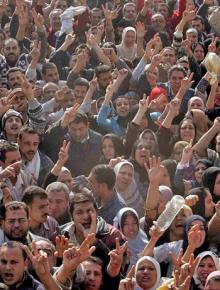Mahalla takes the lead again
Thousands of workers at the state-owned Mahalla Misr Spinning and Weaving--the largest textile plant in Egypt and the flagship of an industry that is the biggest source of employment in the country--began an indefinite strike on Sunday, July 15. Several hundred strikers are occupying the factory's administration building.
The strike is over a number of pay and retirement benefit issues. Workers are also demanding the firing of corrupt company officials who represent the continuation of the Mubarak regime. But the strike's demands also focus on broader political and social issues. Mahalla el-Kubra, an industrial town several hours north of Cairo, has been called Egypt's "cauldron of revolt" because of the militant tradition of textile workers, whose struggles set the stage for the nationwide uprising against dictator Hosni Mubarak in early 2011.
is a long-time activist in Egypt--he currently faces the threat of prison for the "crime" of organizing in solidarity with the victims of a deadly terror attack against a Coptic Christian church in the early morning hours with January 1, 2011. Here, he talks about the potential of the Mahalla strike to give new energy to Egypt's revolutionary process.
MORE THAN 20,000 workers in Mahalla are now participating in an open-ended sit-in, escalating a strike against the corrupt management and for a greater share of profits for workers. Some 300 workers are guarding the factory and the tent camp inside the factory. If management does not meet their demands, workers will start mass rallies in the city to win solidarity from their relatives and neighbors.
The workers' demands include increased production incentives and to get the equivalent of two months' pay for each year spent at work when they retire. Other demands include an adequate minimum wage of 1,500 Egyptian pounds per month and the further development of the company's hospital.
The demands don't concentrate only around the workers' interests, but also aim at the development of the whole textile sector, including calls for the reconstruction of textile industry in Egypt, additional investment in the company and a purge of corrupt management at the holding company.
A statement issued by the strike titled "A Message to the President...I Need My Living" declared:

The workers have suffered greatly from marginalization, poverty and humiliation over many decades. So workers must now be the first concerns of the president, because all that matters to workers is to achieve the goals of the revolution, which are: a decent living, freedom and social justice. We would like to remind the President that the workers toppled the oppressive old regime.
Mahalla's message for Morsi is very clear, showing that Egyptian workers are focused on the social and economic demands of the revolution, and he can't pretend that the revolution is ongoing as long as their social and economic rights aren't met yet.
The Mahalla strike came like a breath of clean air in the current feverish atmosphere as the basic demands of the revolution have suffered, and attention has been drawn to issues such as the constitution and elections, and away from those affecting the future of the broad masses of the poor and the marginalized. The strike can help draw attention away from the focus on religious and secular polarization.
Mahalla brings the hope of correcting the path of the revolution in the right direction, toward the class struggle. It wasn't a surprise to see a wave of strikes take place across the textile sector in Egypt less than an hour after Mahalla strike began, including factories in many other cities and governorates, such as Tanta, al Sharqia and Alexandria. Other sectors, such as electricity service, doctors, metro workers, construction, cement factories, fishermen and real estate tax employees are also participating.
With these actions by Egyptian workers, many political forces and unions have stood up, chanting "Long Live the Workers Movement Struggle!" The Socialist Popular Alliance Party, Egyptian Socialist Party, Revolutionary Socialists, Egyptian Federation of Independent Trade Unions and many other bodies have issued statements in solidarity with Mahalla and the Egyptian workers.
The Egyptian workers have proved today that their revolution is ongoing by real struggle and militant persistence. Will leftists in Egypt prove via the joint struggle and unity that they will be a strong engine in the process of the revolution's continuation? We are all waiting for the answer.


